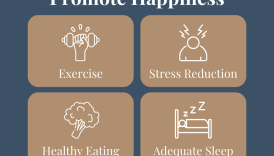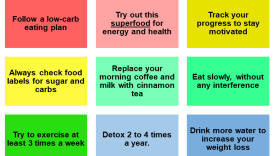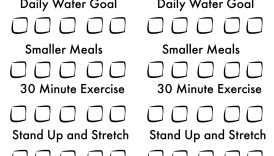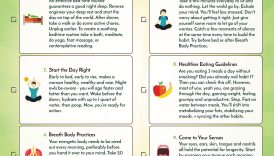The Ultimate Healthy Living Challenge: How to Stay on Track

Why Healthy Living is Important
Healthy living is essential not only for enhancing physical well-being but also for fostering a balanced mindset. When individuals prioritize their health, they often experience increased energy levels, improved mood, and a greater capacity to cope with stress. Just consider how you feel after a nutritious meal or a refreshing workout; the difference is palpable. Embracing a healthy lifestyle means:
- The Ultimate Healthy Living Challenge: How to Stay on Track
- Why Healthy Living is Important
- Setting Goals for a Healthier Lifestyle
- Nutrition
- Balanced Diet for Optimal Health
- Healthy Eating Habits to Adopt
- Exercise
- Creating an Effective Workout Routine
- Staying Motivated to Stay Active
- Mental Well-being
- Importance of Mental Health in Overall Wellness
- Stress Management Techniques
- Sleep
- Benefits of Quality Sleep
- Tips for Improving Sleep Hygiene
- Hydration
- Importance of Staying Hydrated
- Creative Ways to Drink More Water
- Self-care
- Prioritizing Self-care Practices
- Creating a Relaxing Daily Routine
- Social Connections
- Building a Supportive Social Network
- Engaging in Meaningful Relationships
- Healthy Habits
- Breaking Bad Habits for Good
- Establishing Sustainable Healthy Routines
- Enhancing longevity and reducing the risk of chronic diseases.
- Boosting mental clarity and cognitive functions.
- Elevating overall quality of life.
Setting Goals for a Healthier Lifestyle
Setting clear and achievable goals is the cornerstone of sustainable healthy living. Just like planning a trip, knowing your destination helps you navigate the journey efficiently. Start by identifying specific health objectives, whether it’s eating more fruits and vegetables, exercising regularly, or improving sleep quality. Tips for Goal Setting:
- Make it SMART: Specific, Measurable, Achievable, Relevant, Time-bound.
- Break it Down: Tackle larger goals by dividing them into smaller, manageable steps.
- Celebrate Progress: Acknowledge and reward your achievements, no matter how small.
Incorporating these strategies can foster lasting change, guiding you toward a healthier, more fulfilling lifestyle.
Nutrition
Balanced Diet for Optimal Health
A balanced diet is the foundation for optimal health, offering a variety of nutrients your body needs to function effectively. Think of your body as a car; it requires the right fuel to run smoothly. A good mix of macronutrients—carbohydrates, proteins, and fats—along with essential vitamins and minerals, can make all the difference. A well-rounded plate might include:
- Fruits and Vegetables: Aim for a rainbow of colors to maximize nutrients.
- Whole Grains: Opt for oatmeal, brown rice, and whole grain bread.
- Lean Proteins: Include sources like chicken, fish, legumes, and nuts.
- Healthy Fats: Don’t shy away from avocados, olive oil, and seeds.
Healthy Eating Habits to Adopt
Transitioning to healthier eating habits doesn’t have to be overwhelming. Small, consistent changes can yield significant results. Here are some habits worth adopting:
- Plan Your Meals: A weekly meal prep session can prevent impulsive eating.
- Mindful Eating: Take time to savor your food, paying attention to hunger cues.
- Stay Hydrated: Water intake aids digestion and can reduce hunger.
Implementing these practices can create a sustainable path toward better nutrition and overall well-being.
Exercise
Creating an Effective Workout Routine
An effective workout routine is essential for achieving fitness goals and promoting overall health. The key is to design a plan that fits your lifestyle and personal preferences, ensuring you enjoy the process. Think about integrating a mix of cardiovascular, strength, and flexibility training. A well-balanced routine may look like this:
- Cardio: Aim for at least 150 minutes of moderate-intensity exercise weekly.
- Strength Training: Incorporate bodyweight exercises or weights twice a week.
- Flexibility and Stretching: Dedicate time for stretching or yoga to enhance mobility.
Personalize your routine by considering activities you genuinely enjoy; whether it’s dancing, cycling, or swimming, the best workout is one you look forward to.
Staying Motivated to Stay Active
Maintaining motivation can be challenging, but having strategies in place can help. One approach is to track your progress, which can foster a sense of accomplishment. Here are some tips to keep you on track:
- Set Short-Term Goals: Celebrate milestones to stay motivated.
- Workout Buddy: Find a partner to share the journey, making exercise more enjoyable.
- Mix It Up: Vary your workouts to keep things fresh and exciting.
These strategies can help ensure that staying active remains a lasting part of your healthy lifestyle.
Mental Well-being
Importance of Mental Health in Overall Wellness
Mental well-being is a crucial component of overall health and cannot be overlooked. Just as physical fitness is essential for the body, mental health shapes how individuals think, feel, and act each day. For example, when a person feels mentally strong, they’re more likely to be productive, maintain positive relationships, and engage actively in life. Consider these aspects:
- Emotional Resilience: Good mental health equips individuals to handle stress and recover from setbacks.
- Physical Health Link: Mental well-being directly impacts physical health; stress and anxiety can lead to chronic conditions.
- Quality of Life: Prioritizing mental wellness enhances happiness and fulfillment in life.
Stress Management Techniques
Managing stress effectively is vital for maintaining mental health. Different techniques work for different people, so it’s worth experimenting to find what works for you. Here are some effective stress management techniques:
- Mindfulness and Meditation: Taking a few minutes to breathe deeply or meditate can clear your mind.
- Physical Activity: Engaging in exercise releases endorphins, reducing stress.
- Connect with Others: Talking to friends or family can provide support and perspective.
Incorporating these stress management techniques into daily life can lead to improved mental well-being, enhancing overall health and happiness.
Sleep
Benefits of Quality Sleep
Quality sleep is often one of the most overlooked aspects of a healthy lifestyle, yet it plays a pivotal role in overall well-being. Just think back to a time when you had a good night’s rest—it’s likely that you were more alert, productive, and in a better mood throughout the day. Sleep not only allows the body to recover but also enhances cognitive function and emotional stability. Key benefits of quality sleep include:
- Enhanced Memory: Sleep consolidates new information and experiences, aiding better recall.
- Boosted Immune Function: Adequate rest helps the body fend off illnesses.
- Weight Management: Well-rested individuals are more likely to make healthier eating choices.
Tips for Improving Sleep Hygiene
Improving sleep hygiene can lead to more restorative sleep. Here are some practical tips to enhance your nighttime routine:
- Establish a Consistent Schedule: Try to go to bed and wake up at the same time every day.
- Create a Sleep-Conducive Environment: Make your bedroom dark, quiet, and cool.
- Limit Screen Time Before Bed: Reduce exposure to blue light from devices at least an hour before sleep.
By implementing these strategies, individuals can significantly enhance their sleep quality, contributing to better overall health and vitality.
Hydration
Importance of Staying Hydrated
Staying hydrated is fundamental to maintaining overall health, yet it’s something many people often neglect. Just consider how you feel after a long day without enough water—it can leave you feeling sluggish, irritable, and unfocused. Proper hydration supports virtually every function in the body, from regulating temperature to aiding digestion and nutrient absorption. Key reasons to prioritize hydration include:
- Enhanced Physical Performance: Adequate hydration improves endurance and reduces fatigue during exercise.
- Cognitive Function: Even mild dehydration can negatively affect concentration and memory.
- Skin Health: Staying hydrated can reduce dryness and promote a radiant complexion.
Creative Ways to Drink More Water
Finding enjoyable ways to increase your water intake can make a significant difference. Here are some creative strategies:
- Infuse Your Water: Add slices of fruits like lemon or cucumber for a refreshing twist.
- Use a Fun Water Bottle: An attractive or quirky water bottle can encourage you to sip more throughout the day.
- Set Reminders: Use apps or alarms to remind you to drink water regularly.
Employing these techniques ensures that hydration becomes a seamless, enjoyable part of your daily routine, leading to improved health and vitality.
Self-care
Prioritizing Self-care Practices
In the hustle and bustle of everyday life, self-care often takes a back seat. However, prioritizing self-care is essential for maintaining mental and physical health. Just think of it as refueling your vehicle; you can’t expect to go long without a pit stop. When individuals dedicate time to self-care practices, they often experience reduced stress, enhanced mood, and improved overall well-being. Consider incorporating the following self-care practices:
- Mindfulness Moments: Spend a few minutes simply breathing deeply or meditating.
- Creative Outlets: Engage in hobbies like painting, writing, or gardening.
- Digital Detox: Unplug from devices occasionally to reconnect with yourself.
Creating a Relaxing Daily Routine
Establishing a relaxing daily routine is key to sustaining self-care. A structured approach can set a positive tone for your day. Here are some tips to create a calming routine:
- Morning Ritual: Start your day with a peaceful morning routine that may include journaling or light stretching.
- Scheduled Breaks: Incorporate short breaks throughout your day to recharge.
- Evening Wind-down: End your day with calming activities such as reading or herbal tea.
By integrating these self-care practices into a relaxing daily routine, individuals can foster a balanced, healthier lifestyle that nurtures their body and mind.
Social Connections
Building a Supportive Social Network
Building a supportive social network is crucial for enhancing mental health and overall well-being. Human connection is a natural source of joy and strength, not to mention a buffer against stress and loneliness. When individuals cultivate relationships with understanding and supportive people, they naturally experience a lift in morale and emotional resilience. Consider these strategies for building your network:
- Join Local Groups: Engage with hobby or interest-based clubs, such as book clubs or sports teams.
- Attend Community Events: Participate in workshops or festivals to meet new people.
- Volunteer: Contributing your time to a cause can help you connect with like-minded individuals.
Engaging in Meaningful Relationships
Beyond simply expanding your social circle, cultivating meaningful relationships is vital. These connections provide emotional support and a sense of belonging. Consider prioritizing:
- Quality Over Quantity: Focus on nurturing deep relationships instead of having many superficial ones.
- Active Listening: Show genuine interest in others by listening actively during conversations.
- Regular Check-ins: Make it a habit to reach out to friends and family, ensuring they feel valued and supported.
By investing in a supportive social network and engaging in meaningful relationships, individuals can enrich their lives immensely, fostering both mental health and happiness.
Healthy Habits
Breaking Bad Habits for Good
Breaking bad habits is an essential step toward achieving a healthier lifestyle. It’s often easier said than done, but understanding the triggers that lead to these habits can make a big difference. For instance, if snacking while watching TV is a routine, consider changing the environment or keeping healthier snacks at hand. Here are some effective strategies to break free:
- Identify Triggers: Keep a journal to track when and why you engage in bad habits.
- Replace Habits: Substitute unhealthy behaviors with better alternatives, like taking a walk instead of binge-watching.
- Set Clear Goals: Define specific, achievable goals—like reducing soda intake to once a week.
Establishing Sustainable Healthy Routines
Once bad habits are addressed, establishing sustainable healthy routines is crucial for long-term success. These routines create consistency and make healthy choices easier. Consider these tips:
- Start Small: Incorporate one new habit at a time, allowing yourself to adjust.
- Be Flexible: Life is unpredictable, so adapt your routine when necessary without abandoning it entirely.
- Track Progress: Use apps or journals to celebrate your achievements, reinforcing positive behavior.
By breaking bad habits and establishing sustainable routines, individuals can pave the way for a healthier and more fulfilling lifestyle.





